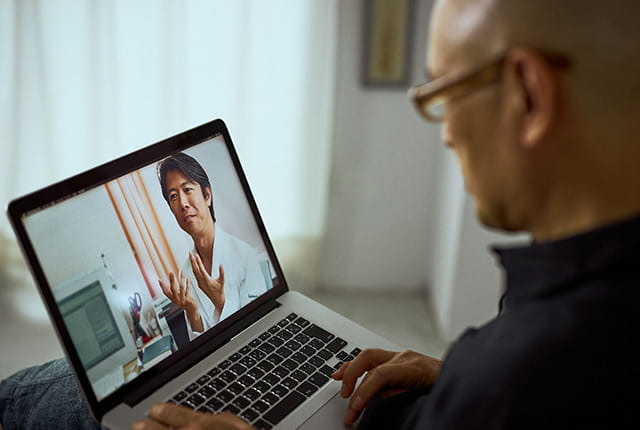Hybrid Maze
What You Need to Know:
A minimally invasive maze procedure is an endoscopic surgery done to treat atrial fibrillation.
Write down the correct date, time and location of your surgery.
Arrange a ride home. Ask a family member or friend to drive you home after your surgery or procedure. Do not drive yourself home.
Ask your healthcare provider if you need to stop using aspirin or any other prescribed or over-the-counter medicine before your procedure or surgery.
Dye may be used during your surgery to help your healthcare providers see the blood vessels better. Tell your healthcare provider if you have ever had an allergic reaction to contrast dye.
You may be asked to stop smoking. Ask your healthcare provider for more information if you need help quitting.
You may need to stop driving, lifting heavy things or doing strenuous or tiring activities.
Your healthcare provider may order an EKG, electrophysiologic studies (EPS), or transthoracic and transesophageal electrocardiogram (TEE). You may also need to have a cardiac catheterization, CT scan, chest x-ray and blood tests. Talk to your healthcare provider about these or other tests you may need. Write down the date, time and location for each test.
Your healthcare provider may give you heart medicines to help control your irregular heartbeat. Ask your healthcare provider for more information about these medicines.
You may be given medicine to help you sleep.
Ask your healthcare providers about directions for eating and drinking.
Your bowel may need to be emptied and cleaned out before your surgery. Your healthcare providers may give you a liquid medicine called an enema. This will be put into your rectum to help empty your bowel. Your healthcare provider will teach you how to do this.
Ask your healthcare provider before you take any medicine on the day of your surgery. Bring a list of all the medicines you take or your pill bottles with you to the hospital. Your providers will check that your medicines will not interact poorly with the medicine you need for surgery.
Your healthcare providers may insert an intravenous tube (IV) into your vein. A vein in the arm is usually chosen. Through the IV tube, you may be given liquids and medicine.
An anesthesiologist will talk to you before your surgery. You may need medicine to keep you asleep or numb an area of your body during surgery. Tell healthcare providers if you or anyone in your family has had a problem with anesthesia in the past.
You or a close family member will be asked to sign a legal document called a consent form. It gives healthcare providers permission to do the procedure or surgery. It also explains the problems that may happen and your choices. Make sure all your questions are answered before you sign this form.
An endotracheal tube (ET) connected to a breathing machine may be put into your mouth or nose. The tube is used to keep your airway open and help you breathe during surgery. Your surgeon may need to insert a pulmonary artery catheter to see how well your heart is working. A catheter is a tube that is threaded into your heart through a blood vessel in your chest, neck, arm or leg. Another tube with a small ultrasound sensor on the end may also be moved down into your esophagus. This will allow your healthcare provider to see your heart clearly.
Your healthcare provider will make a small incision in your chest to insert the endoscope. Two smaller incisions are also made between the ribs to insert the other instruments. Small incisions will be made in the right and left atria (upper chambers) of your heart and then sewn closed. This will form scar tissue and a maze where the impulses can travel in only one direction. Your surgeon may also use freezing substances, radio frequency, microwave or ultrasound energy to create scar tissue. The openings and incisions in your chest are then closed with stitches and staples. A bandage is placed over your incision to control bleeding.
You will be taken to a room to rest until you are fully awake. Your healthcare providers will monitor you closely for any problems. Do not get out of bed until your healthcare provider says it is okay. When your healthcare provider sees that you are okay, you will be able to go home or be taken to your hospital room. Your healthcare providers may leave you connected to a ventilator (breathing machine) after surgery to give you oxygen. You may have the ET tube removed after you are awake and can breathe well on your own. The catheter inserted for the procedure may be removed and a tight pressure bandage will cover the incision. A healthcare provider may remove the bandages soon after surgery to check your wound.
- You cannot make it to your procedure.
- You have a fever.
- You feel dizzy or lightheaded.
- You feel new or more palpitations in your chest, neck or throat.
- You have questions or concerns about your procedure.
Seek Care Immediately If:
- You have any of the following signs of a heart attack:
- Squeezing, pressure or pain in your chest
- and any of the following:
- Discomfort or pain in your back, neck, jaw, stomach or arm
- Shortness of breath
- Nausea or vomiting
- Lightheadedness or a sudden cold sweat
- You have any of the following signs of a stroke:
- Numbness or drooping on one side of your face
- Weakness in an arm or leg
- Confusion or difficulty speaking
- Dizziness, a severe headache or vision loss
Complications from surgical ablation maze procedures have generally been less than 1 percent. Complications may include fluid retention and cardiac arrhythmia the first few weeks after surgery, but those usually subside as the heart and body heal. In addition, some patients have needed a permanent pacemaker due to injury in surgery or because their atrial fibrillation masked problems with the natural pacemaker.
It can cure atrial fibrillation, less recovery time and less risk of complications, many patients require no further treatment, and it can remove the need for medications such as blood thinners, and it reduces the risk of stroke and blood clots.
Navigate Your Health


Find a Heart & Vascular Physician
Find a Heart & Vascular Physician
Meet our doctors who specialize in the full range of heart and vascular care. Our team of experts has experience in a variety of specialty areas. Together, we provide comprehensive evaluation, diagnosis and treatment options.
Find a Doctor

Patient Portal
Patient Portal
If you are a patient at Orlando Health Heart & Vascular Institute, our free online patient portal provides an easy and secure way to manage your health information. Reach us from any location at a time that’s convenient for you.
Learn More

Virtual Visit
Virtual Visit
Need to talk with a doctor, but don’t want to leave your home? Try our virtual visit (telehealth) option to connect with a physician from your phone, tablet or computer.
Learn More
